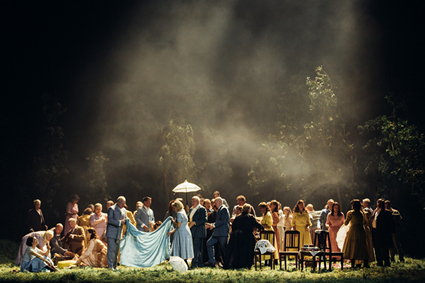| Opera Reviews | 25 April 2024 |
Michael Nagy's Onegin dominates the second castby Catriona Graham |
|
| Tchaikovsky: Eugene Onegin
Edinburgh International Festival 16 August 2019 |
|

|
|
|
Why do opera directors make things hard for themselves? There is no way that Liliana Nikiteanu’s Larina could rest a jellypan on her lap while she filled jars with jam. The setting point for jam is 105° C. A table would have been enough, but clearly was not in director Barrie Kosky’s or set designer Rebecca Ringst’s ideas for Eugene Onegin. If Tchaikovsky’s opera can, sometimes, seem to be misnamed and is really about Tatyana, this Komische Oper Berlin production at the Edinburgh International Festival revolves round the singing and acting talents of floppy-haired Michael Nagy, who seems to have strayed in from a Richard Curtis film. Not nearly as sophisticated and worldly-wise as he thinks he is, his boyish charm gives him success with girls, particularly ones like Tatyana. Natalya Pavlova is convincingly teenage and angst-y, morphing into the self-contained, elegant society hostess Princess Gremin. The spotlit Letter Song commences with her back to the audience, her hands expressive twisting and interlocking, turning round when she sings ‘I place my fate in your hands’. There’s a right battle of wills between Tatyana and Filipyevna over the addressee of the letter. Margarita Nekrasova imbues the old nurse with wit and insight as well as love for her nurslings. Tatyana’s name-day ball is a tensely uncomfortable affair, with Onegin flirting with Tatyana’s younger sister Olga, engaged to his friend Lensky. Maria Fiselier is a charming Olga, apparently as uncomplicated as Tatyana is angst-y. Aleš Briscein’s Lensky is a happy soul, till shocked at Olga’s behaviour. The men fall out spectacularly, and Lensky demands satisfaction. Dawn brings Lensky’s farewell aria; Briscein eschews mawkishness, despite being very drunk. As is Onegin. The duel happens off-stage, Tatyana running on to be startled by the shot. We next see Onegin in a cold white room, with a gorgeous sofa and two chairs, as he soliloquises about his dissatisfaction with life, till the room is invaded by ball guests. He notices a beautiful, poised woman and asks his friend and host Prince Gremin who she is. Dmitri Ivashchenko sings, fervently, of his love for his wife, Tatyana; he is younger than many Gremins, too often creepily old enough to be Tatyana’s father. Approached by Onegin, Tatyana’s desire for him returns. Now it is Onegin who is angst-y, as he realises his youthful mistake. Stage-hands dismantle the white room, even motioning Onegin off the sofa, and he is back in the country. He pours out his heart to her, but she rejects him, however reluctantly. Pavlova and Nagy are excellent in this highly-charged scene, culminating in Tatyana leaving. The chorus-work is stunning, picnicking, dancing, often moving slowly past Tatyana on the revolving stage. They sit in a circle round Tatyana for the birthday cake, then chairs are re-arranged in pairs as if they were dancing couples. Klaus Bruns’ colourful and elegant costumes complement the colours and elegance of the music, brought out by Ainārs Rubiķis; Tchaikovsky did write such wonderful song and dance music.
|
|
| Text © Catriona Graham Photo © Ryan Buchanan |
|







